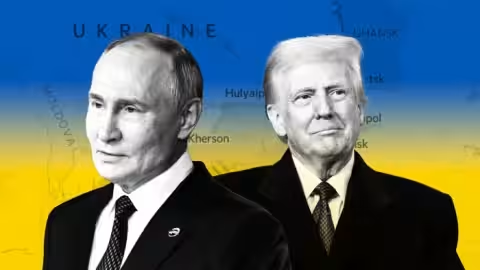President Donald Trump has publicly acknowledged that Russia indeed initiated an attack on Ukraine, marking a significant departure from his earlier positions, where he characterized the situation in Ukraine as a complex geopolitical conflict without direct attribution of responsibility to Russia.
During a recent press conference, Trump stated, “It is clear that Russia has acted aggressively towards Ukraine. We cannot ignore the evidence of their military actions.” His comments come at a time when the international community is grappling with the ongoing war that has resulted in thousands of casualties and a humanitarian crisis in Eastern Europe. The former president’s shift in rhetoric is not only striking but also raises questions about his potential influence on the Republican Party and U.S. foreign policy.
Trump’s acknowledgment of Russia’s aggression aligns with the views of many political analysts and foreign policy experts who have criticized his previous approach. During his presidency, Trump often downplayed Russia’s role in international conflicts, leading to concerns about his administration’s commitment to upholding democratic values abroad. This latest statement appears to reflect a newfound willingness to confront the realities of Russian expansionism, a stance that may resonate with both party members and the broader American public.
Political commentators are already speculating on the implications of Trump’s reversal. Some believe it could signify a shift in the Republican Party’s stance on foreign policy, especially as the party prepares for future elections. Many Republican leaders have condemned Russia’s actions and supported increased military aid to Ukraine, a position that contrasts sharply with Trump’s earlier assertions. This change could be a strategic move to align himself with the party’s current sentiments and regain favor among voters who prioritize foreign policy issues.
Moreover, Trump’s acknowledgment comes as the Biden administration continues to face scrutiny over its handling of the Ukraine crisis. Critics argue that the administration has not done enough to deter Russian aggression, while supporters claim that diplomatic efforts are essential for long-term stability. The former president’s statements may place additional pressure on the current administration to reassess its strategy and engage more robustly with international allies in support of Ukraine.
In response to Trump’s comments, Ukrainian officials have expressed cautious optimism. They welcome any acknowledgment of Russian aggression but remain skeptical of the motivations behind such statements. “We need decisive actions, not just words,” stated a spokesperson for the Ukrainian government. “The situation requires a united front against the ongoing threats to our sovereignty.”
As the conflict in Ukraine continues to evolve, the implications of Trump’s reversal are still unfolding. The former president has historically maintained a complex relationship with foreign policy, often favoring an America First approach that prioritizes domestic issues over international commitments. However, this latest development may indicate a shift in his narrative, one that could have lasting effects on his political future and the broader landscape of American foreign policy.
In conclusion, Trump’s recent acknowledgment of Russia’s attack on Ukraine signals a notable pivot in his approach to international relations. As the world watches closely, both supporters and critics of Trump will be keenly interested in how this change will influence the Republican Party’s direction and the U.S.’s role on the global stage. The unfolding situation in Ukraine remains critical, and American leadership will be key in shaping the outcome of this ongoing crisis.



